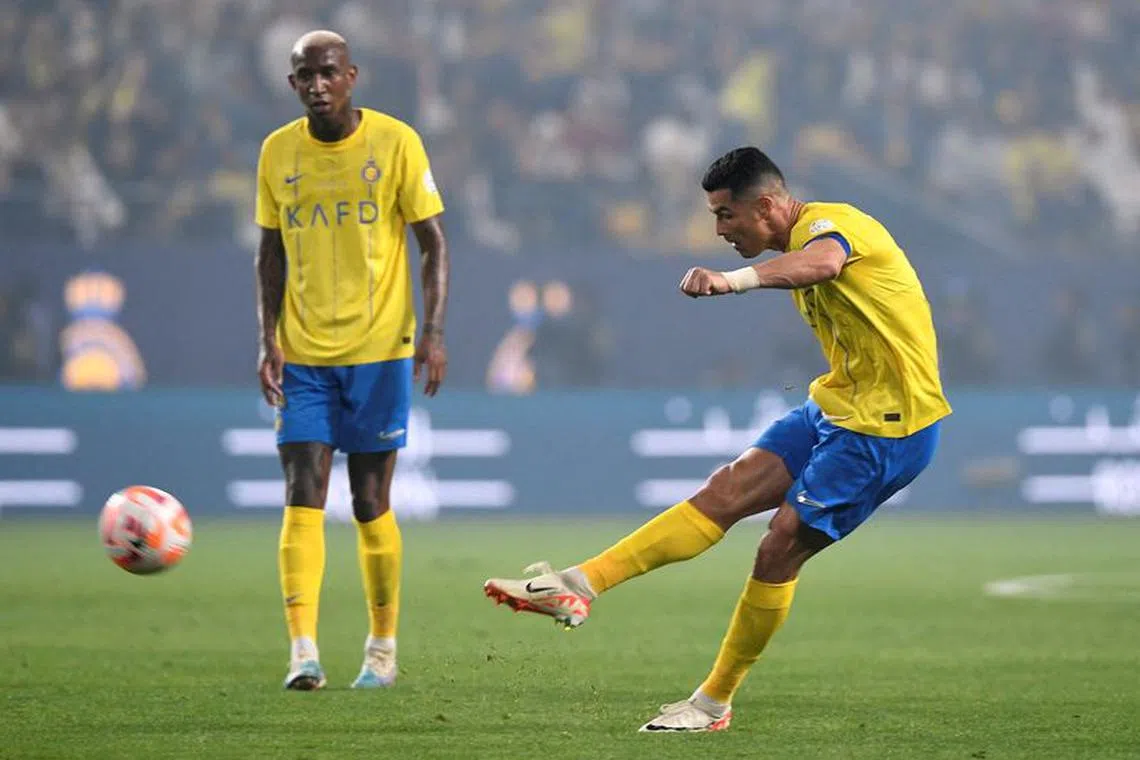Saudis ready to play long game to realise dream
Sign up now: Get the biggest sports news in your inbox

Saudi Arabia will be thrust into the spotlight as the kingdom expands a sport portfolio with their signing of Cristiano Ronaldo (right).
PHOTO: REUTERS
LONDON – A seismic year for football in Saudi Arabia witnessed the turbo-charging of its domestic league with expensive foreign superstars, an audacious bid to host the 2034 World Cup
And 2024 will only be a few weeks old before Lionel Messi and Cristiano Ronaldo renew their iconic rivalry in Riyadh.
Argentina’s World Cup-winning talisman Messi did not join the exodus to the Saudi Pro League, but his Inter Miami team will face Al-Nassr, Ronaldo’s club, in the Riyadh Season Cup football tournament on Feb 1.
That match lacks the gravitas of the 36 previous clashes between the two icons. But it will once again thrust Saudi Arabia into the spotlight as it expands a sports portfolio already bulging with LIV Golf, boxing, tennis and Formula One.
When Saudi Arabia’s Public Investment Fund (PIF) bought English Premier League club Newcastle United in 2021, it underlined the country’s intent to follow the lead of the United Arab Emirates and Qatar – its smaller neighbours who have bankrolled some of Europe’s biggest football clubs.
But Saudi Arabia wants to go further as part of its Vision 2030 project aimed at diversifying its economy and glossing its global image.
Developing a domestic league that can become one of the top-10 in world football is crucial and no expense is being spared in trying to make that a reality.
PIF took control of four of Saudi Arabia’s biggest clubs in June – Al-Nassr, Al-Ittihad, Al-Ahli and Al-Hilal – then spent huge amounts recruiting the likes of Neymar, Karim Benzema, Riyad Mahrez and Sadio Mane, to name a few.
Around one billion dollars of talent arrived in the summer and, as the January window opens, fans of top European clubs might well wonder who is next.
Cynics might say such rapid growth from a low-profile regional league to one capable of disrupting football’s old order is doomed to failure, pointing to the Chinese Super League that sparkled briefly before fizzling out.
But the Saudi approach – endorsed by Crown Prince Mohammed bin Salman – looks built for the long haul, even if the initial splurge on player recruitment might slow down.
“I’m hoping it (January) is not very busy, because I think the job that was done has been quite interesting and aggressive... most clubs have what they need,” Michael Emenalo, the Saudi Pro League’s director of football, said recently.
Quality players still at their peak are the prime targets and Liverpool’s Mohamed Salah and Paris Saint-Germain’s Kylian Mbappe will be on the shopping list.
“I think we will still see some acceleration over the next couple of (transfer) windows but then you will see a sort of tapering off and it becoming a more long-term strategy,” Dan Plumley, a football finance expert at Sheffield Hallam University, told Reuters.
“The end goal is still a long way but the strategy is in place and they have some really smart people and experience working on it. And money will clearly not be an issue.
“Personally, I think it will be sustained for the long term.”
Saudi Arabia, unlike 2022 World Cup hosts Qatar, has a strong football culture and little more than a year ago, the Green Falcons beat eventual champions Argentina at the World Cup, sparking massive celebrations.
While catapulting the Saudi Pro League to the top table of world football is one priority, investment in leading worldwide clubs and organisations is another.
The rekindling of the European Super League (ESL) project after December’s European Court of Justice ruling will not have gone unnoticed by Saudi Arabia, who could fund the ESL as another way to spread their influence.
And with their 2034 World Cup bid – the only one received – almost certain to be ratified by Fifa in 2024, the Saudi bubble does not look like bursting any time soon. REUTERS


